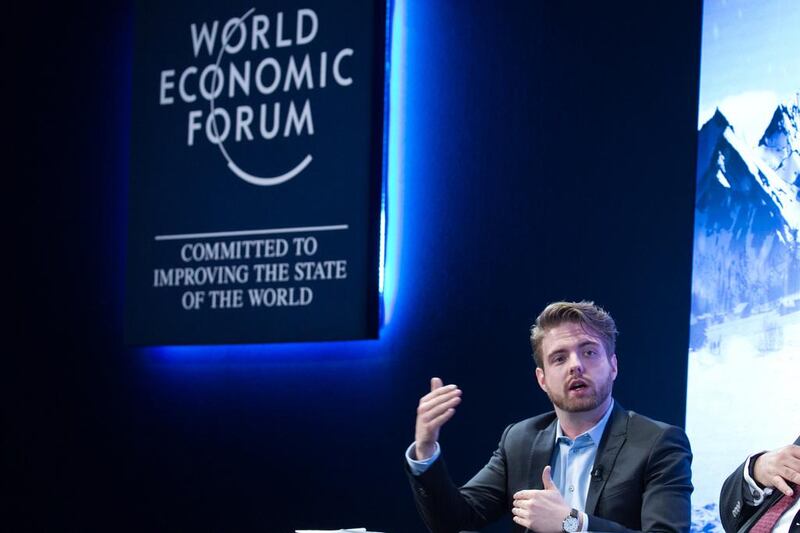DAVOS // Blockchain, the financial technology company that has pioneered the introduction of digital crypto currency, is planning a major expansion of its business in the Middle East, its chief executive Peter Smith said at the World Economic Forum.
Mr Smith told an audience debating the effect of the Fourth Industrial Revolution on Arab economies: “I am very optimistic about the Middle East and we plan to invest big there. I’m really excited about it. It’s a great chance to build a new financial infrastructure in the region.”
He declined to say where the investment would be, or specify its value.
Mr Smith added: “What’s exciting is that there’s this big drive for change in the economies. Saudi Arabia and the UAE want to leapfrog into the digital age in financial technology.”
Khaled Biyari, chief executive officer of Saudi Telecom, said that Saudi Arabia was seeking to adopt fintech as part of its National Transformation Plan.
“We in the kingdom and others in the region have been addicted to natural resources and as a result we have been always subject to price fluctuations. The Saudi vision is looking to convert the focus towards investment in technology.”
He highlighted the recent US$45 billion investment by the kingdom in the $100bn high-tech investment vehicle launched by SoftBank of Japan, and noted Saudi plans to provide high-speed broadband access to all parts of the economy.
Other Middle East leaders were also enthusiastic about the prospects for technology change.
Youssef Chahad, the prime minister of Tunisia, said the country was seeking a revolution in its economy to match the political revolution of 2011. “The digital transformation is important for us. Without Facebook our revolution would have gone more slowly or taken a different direction.”
He estimated that digital technologies could add 2 per cent to the country’s growth rate over the next three years.
Tarek Kabil, the Egyptian minister for trade and industry, said that the Fourth Industrial Revolution was an “opportunity and a challenge”, as part of the country’s “bold economic reform programme”.
But he also pointed out that there were downside factors that might involve an increase in unemployment and implications for the country’s small to medium sector.
“Big companies will get bigger,” he said.
All the leaders agreed that there remained challenges in how to regulate fintech, following allegations that terrorist groups had used crypto currencies to fund their activities.
Mr Smith denied there had been any proven incidence of Bitcoin being used by terrorists.
Egypt was introducing a product that would allow people deterred by risks in visiting to experience the Egyptian Museum in Cairo via a virtual tour.
There was a mixed reaction to the possibility of robotics being introduced in the country.
One respondent to a poll about the use of driverless cars in Cairo said: “Look what happens when there are drivers. Imagine what it would be like with none.”
business@thenational.ae
Follow The National's Business section on Twitter
* This story has since been amended to remove the reference to Blockchain.com being in partnership with the Dubai Government. This is not the case .





